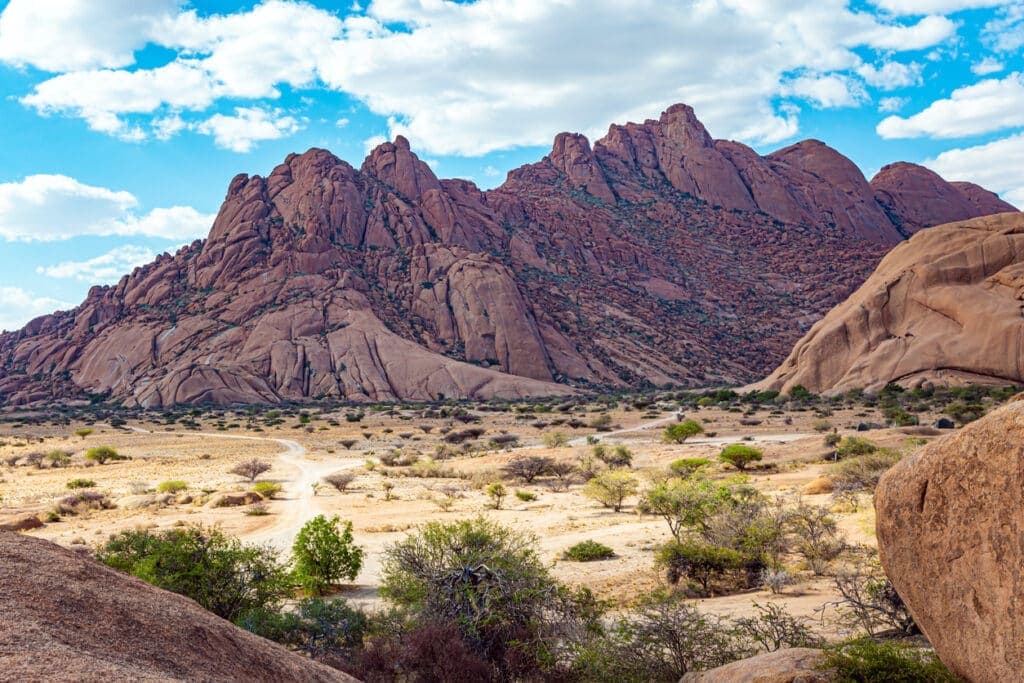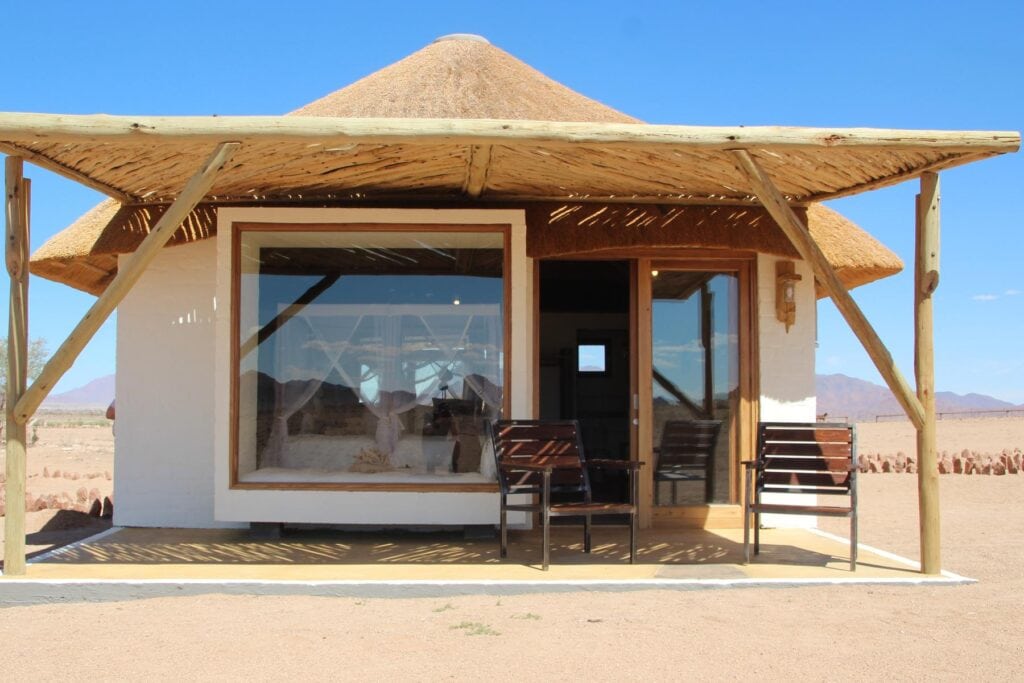As the first African nation to establish community-based conservancies, Namibia has long championed sustainability and environmental protection.
Following the creation of the Namibian Community Based Tourism Association in the nineties, today these sustainability efforts continue, and there are now 80 private wildlife conservation areas across Namibia.

This continued sustainability drive has led to a wave of eco-friendly camps and lodges being established throughout the country. In this article we’ll take a closer look at 6 of the most eco-friendly accommodation options you can look forward to visiting in Namibia.
Desert Homestead Lodge
Ideally situated right on the doorstep of the Namib-Naukluft National Park, Desert Homestead Lodge consists of 26 guest cottages. Contemporary decor, locally made soft furnishings, and bright airy spaces will have you feeling right at home.

The main building houses a restaurant and bar with plenty of comfortable leather seating. Positioned on the lower ground level, the cottages enjoy panoramic views of the sprawling desert landscape, and you’ll easily spot oryx and springbok from your patio. Two pools with outdoor seating offer the perfect way to cool off after a day of exploration.

Activities at the lodge include Sossusvlei safaris, hot air balloon safaris, sundowner game drives, guided hikes, and horse riding. Desert Homestead Lodge runs completely on solar electricity including solar water heaters. Vegetables and herbs are produced local to the lodge, and firewood is obtained by de-bushing the nature reserves.
Profits from the lodge are invested in establishing and maintaining Ondili Nature Reserves. Double rooms from $200 per person in the low season and from $500 in high season.
Shipwreck Lodge
Located between the Hoarusib and Haonib rivers in the Skeleton Coast National Park, Shipwreck Lodge consists of ten chalets designed to look like shipwrecks. Each cabin has a private bathroom and outdoor deck, as well as a wood burning stove for chilly nights.

The central lodge building is where meals and communal activities happen and there’s a bar for drinks and snacks. Activities at Shipwreck Lodge include beach lunches, 4×4 tours to the Hoarusib River, explorations of the Skeleton Coast, quad biking, sandboarding, and sundowner drives.

The lodge uses solar power for heating and employs complex waste and water management procedures to ensure a small footprint and minimal impact on the environment.
In fact, Shipwreck Lodge has scored 90% in their sustainability rankings for conservation, water, energy, and waste management efforts. Cabins from $650 per person in low season and $1500 in high season.
Desert Rhino Camp
Located in the Palmwag Reserve, between Etosha and the Skeleton Coast, the remote Desert Rhino Camp features just 8 Meru-style tents with en-suite bathrooms and showers. All of the tents enjoy endless views of the rocky plains.
The main covered lounge is situated centrally and features a dining room and bar. Activities at Desert Rhino Camp include rhino tracking, sundowner game drives, and guided bush walks.

The camp is powered by a hybrid system, where the generator operates for a maximum of 8 hours a day. Each tent has its own solar panel and inverter, as well as a solar-powered geyser. Reverse osmosis filtration provides high-quality drinking water and negates the use of plastic drinking bottles.

Additionally, a portion of the camp’s profits are donated to Save the Rhino Trust. Double rooms from £496 per person in low season and from £1022 during high season.
Damaraland Camp
Damaraland Camp is situated in the remote Kunene region of northwest Namibia. The camp consists of 10 canvassed and thatched suites. Bathrooms are adobe walled with reed screens and roll-down canvas doors. The camp features a pool, bar, family dining space, gift shop, and a communal space with awe-inspiring views.

Food is locally sourced, and the enthusiastic chefs offer authentic and traditional cuisine as well as fusion dishes from around the globe. Activities at the camp include spotting desert-adapted elephants, guided game drives, African rock art tours, and sundowner drives.

The camp is powered by a hybrid system, and each tent features a solar power panel, inverter, and a solar-powered geyser. The camp employs staff from the local community, and fruit and vegetables are sourced from a nearby farmstead. Rooms from $250 per person in standard season and from $710 per person during the peak season.
Ongava Lodge
Situated in the privately-owned Ongava Game Reserve along the southern partition of Etosha National Park, Ongava Lodge is located close to the top of a hill in the foothills of the Ondundozonanandana range. The lodge itself features 14 rock and thatch style en-suite chalets.

Each chalet offers impressive views of the reserve, with the main lounge and dining area enjoying panoramic views of the local waterhole. Cool off and rejuvenate after a game drive next to the pool or at the lodge’s spa.
Activities at Ongava Lodge include guided game drives, visits to the Ongava Conservation Center, sundowner drives, rhino bush walks, and visits to the water hole hide.

Effective management of water and waste facilities, sourcing groceries locally, and employing locals from the community are just three ways Ongava Lodge shows its commitment to sustainability. Chalets range from $885 per person in high season and $660 during low season.
Okonjima Plains Camp
Okonjima Lodge offers a wide range of accommodation, from private campsites to luxurious safari lodges. Guests here have access to their own private chef, safari vehicle, and guide. Eight thatched wooden chalets are spaced 250 ft apart, giving guests ample privacy and a sense of spaciousness.

All the bedrooms feature uninterrupted views of the surrounding wilderness and you’ll be able to sport warthogs, kudu, and eland during the course of the day. Fresh food is sourced locally from the surrounding community farmlands.

Activities at Okonjima include leopard tracking, endangered species drives, guided game drives, visits to the AfriCat Foundation Carnivore Care and Information Center, self-guided walks along established nature trails, pangolin tracking, rhino tracking, and night drives.

The reserve has won several eco awards for their work preserving the area and its surroundings, as well as for its conservation efforts. Accommodation ranges from $650 per person per night during peak season and $550 per person per night in low season.
Author: Devryn Panaino
Published:
Last Update:
Part of the Namibia Safaris Safari Collection